Communication Skills Guide: Examples of 11 Good and 8 Poor ones
Having effective communication skills is essential to every aspect of life, from going through school/college, to simply sharing ideas, speaking in public, nailing an interview, for better prospects in bidding proposals and whether we like it or not, we sometimes have poor communication skills. Well, it is not wrong to accept it; in fact, it will help you correct your mistakes.
Healthy communication is essential to your day to day activities, even outside your workplace. I mean, good communication skill is the only way we humans know how to stay connected with the people around us.
More importantly, good communication in the workplace provides a positive environment that will boost creativity and the general productivity of the team.
In this article, you will learn everything you need to know about communication skills, the definition of communication, its importance, types, styles as well as where you can use them.
Related Topics you might like:
How to Jump-start your career with 10 Effective Communication Skills?
7 Basic Elements of Public Speaking and 8 Principles for Effective Delivery
14 Types of Speech and How to Use Each for Achieving the Desired Result
What is Communication?
Communication is act of passing meanings across through a medium, it usually takes place through the use of the semiotic rule, understood symbols and signs, and this attribute makes communication applicable to everyone, even those who can’t speak.
In its simplest form, communication is an act of transferring meanings from an individual or group to another.
Although communication is usually received by an individual based on their level of understanding or experience about a topic, the other person may give a completely different interpretation of what you are saying.
For this reason, it is very important to learn and understand the importance of effective communication skills as well as when and how to use them.

4 Types of Communication Skills
Video link:
https://study.com/academy/lesson/types-of-communication-interpersonal-non-verbal-written-oral.html
There are four types of communication skills, and each type is most suitable under a particular situation to convey meanings to the other partner.
Irrespective of the type of communication skill you may adopt, some common traits about each type of communication skill is the fact that; they are meant to inform, persuade or educate.
The following are the four major types of communication:
1. Non-Verbal Communication Skills
A non-verbal communication skill is a type of communication a lot of people guess and most often miss the story halfway.
In non-verbal communication, you tend to listen and observe more while expressing your non-verbal cues.
Take, for instance, an employee who calls in sick on stock auditing day, and this being the third time in three years, a similar excuse is occurring.
In some cases, this may be the same person you saw the last night without any visible sign of sickness.
In such a situation, you may mutter ‘okay, I hope you get well soon’ but deep within you, your tone conveys disbelief.
4 Forms of Non-verbal Communication
- Body Language
Although closely linked with psychology, body language is a major non-verbal communication skill that can convey disapproval, anger, happiness, and many other expressions as you can remember.

- Paralinguistic
This refers to the level of loudness, pitch, or tone of your voice, which in most cases, may express sarcasm, boredom, seriousness, emphasis, and what have you.
- Facial Expression
This includes any form of expression with your face, which shows your response to what you say or hear.
Facial expression may include pursed lips, eye contact, raise eyebrows, and even smirking.
- Eye Contact
Eye contact is one of the most valued communication skills. Although a non-verbal communication skill, having someone look straight into your eyes, shows attention and interest in what you are saying. Check: 6 Solid tips for better eye contact
2. Visual Communication Skills
Whenever you are reading or seeing anything that expresses an idea, sends a message or gives you a piece of information about something, that is visual communication.
Take, for instance, the male or female-like stick figures on the door of public convenience is a good example of visual communication since it helps you to known which convenience is for males and females.
Another good example is when you receive a thumb’s up from someone, you are sure that you are on the right track, and what you are doing is okay by them.
3. Written Communication Skills
Written communication is an excellent way to express your ideas in a written format. Written communication is mostly used in business communication in the form of text messages, email, letters, and others.
When engaging in a written form of communication, the acronym “SHAKESPEARE” should guide you on how to keep your message concise.
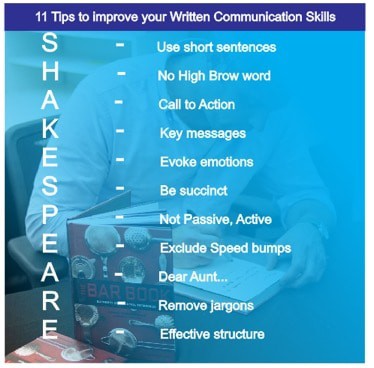
4. Verbal Communication Skills
Verbal communication is as simple as presenting your ideas through speech. Verbal communication is particularly crucial for people working as a customer representative, sales team, as well as those in business generally.
Just like in non-verbal communication, verbal communication comes in 4 different forms
The 4 Types of Verbal Communication
- Intrapersonal
When you have a conversation with yourself, either within your thoughts or voiced out, you are merely engaging in intrapersonal verbal communication.
- Interpersonal
Interpersonal verbal communication is one that takes place between two people, with each person having the floor while the other listens.
In this form of verbal communication, the participants involved may have to switch roles to keep the communication going.
- Small-Group
This is an example of a press conference or board meetings where only two or more people are involved.
In a small group form of verbal communication, the number of participants is usually kept small so that each person can have the opportunity to give their input.
- Public Communication
In public communication, one person is usually the sender of the message to a group of people. You can learn all about how to become a better public speaker through the many articles available on this blog. I recommend starting with: 18 Common Public Speaking Questions Answered.
5 Basic Styles of Communication Skills
There are 5 different styles of communication, and all of them are common to both the verbal and non-verbal forms of communication. They include:
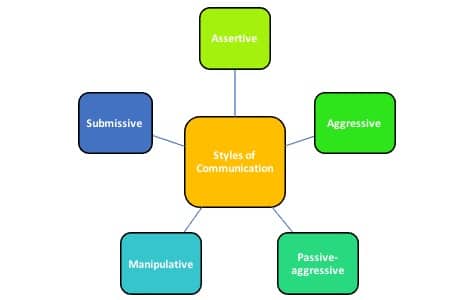
1. Aggressive
An aggressive style of communication is typical among people who pass their messages across or express their emotions with an overbearing attitude, which may, in most cases, be at the detriment of others.
2. Passive Aggressive
The passive-aggressive style of communication is typical among people who look calm and passive but are good at talking down others in a very subtle manner.
In most cases, such people are seen as being unable to handle their anger directly.
3. Assertive
An assertive style of communication is regarded as being the healthiest, both emotionally and mentally.
Although the assertive style communication is common among very few people, assertive communicators are good at advocating for themselves, and addressing issues immediately they arise.
4. Submissive
A speaker with a submissive style of communication is focused more on making others happy.
They tend to see others’ needs being more important than theirs, and they believe that others can do more than they could ever do.
5. Manipulative
This style of communication is peculiar to individuals with their best interest in mind.
A manipulative speaker is an expert in controlling others and ensuring that others feel sorry for them and try to meet their needs. Manipulative style of communication is a very tricky communication skill.
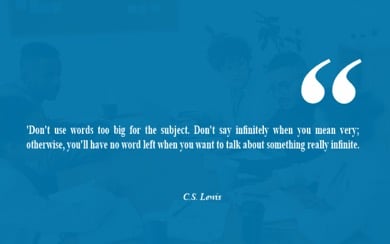
Importance of effective Communication skills
Video link: https://students.unimelb.edu.au/academic-skills/english-language-development/why-are-good-english-and-communication-skills-important
The importance of good communication skills cannot be overemphasized. It is all-encompassing and cuts across our day to day activities.
Below are some importance of developing a good and effective communication skill
1. Enhances your learning skills
Communication skills have a significant impact on your ability to add new ideas to your existing knowledge.
For instance, you can learn how to engage in effective public speaking by first engaging in conversations with others, followed by answering questions as giving your opinion on the subject matter.
Also, you can learn how to write by, first of all, learning how to read and interpret the information in what you read, and then writing yours through critical thoughts.
Communication skills are the best way to absorb information and give your opinion and idea in a clear, meaningful, and concise manner, which others can understand.
2. Help you to speak concisely
It is a natural feeling to feel a bit tensed when speaking to your boss in the office or even when speaking to a prospective client.
However, with adequate communication skills, you can learn how to communicate effectively in any situation, as well as how to structure your information to ensure that your time with others was impactful.
3. Furthers your Career Prospects
Everyone wants to create the best impression at first contact with others. And when it comes to your professional relationships with others, good and effective communication skills will help you to represent your business and portfolio in the best manner.
In addition to your portfolio as a professional, good communication skills will also boost your chances of succeeding in your business and career.
4. In high demand by businesses
Every year, employers’ desirable skills are usually analyzed, and a good written and communication skill is always at the top spot of such skills they desire from employees.
For this reason, employees are usually advised to enroll for in-person training and online courses to boost their communication skills as well as their overall presentation.

Communication is among the in-demand soft skills that are most sought after by employers.
Source: LinkedIn Research.
Other benefits of effective communication skill
Every business knows how good effective communication skills can be in helping the organization to succeed in today’s highly competitive business stage.
Here are other outstanding benefits of effective communication skill to the growth and success of a business.
- Clearer, more streamlined workflow
- Convincing and compelling corporate materials
- Stronger decision-making and problem-solving
- Sound business relationships
- Successful response ensured
- Upturn in productivity
-
8 THINGS YOU CAN DO TO ACE ANY JOB INTERVIEW

The happiness when receiving a call marking the job interview gives rise to endless anxiety. After all, it’s only a few minutes to prove your worth, impress the recruiter and seize the opportunity. However, to do well at the job interview, you need to think about what you will say, how you will present yourself,…
-
An Easy Guide to All 15 Types of Speech

We keep learning that there are three types of speeches, informative speeches, persuasive speeches and special occasion speeches. However, I believe and know that there are many more such as debates, motivational speeches, forensic speeches, impromptu speeches, eulogy, and so on. Here’s a growing list of over 13 types of speech and tips on how…
22 stats on the benefits of building strong communication skills
- According to mba.com, 69% of businesses say that strong communication skills are one of the reasons why they are confident in hiring business school graduates.
- More than 80% of Americans think that employee communication skill is a major factor that establishes trust with their employers – Slideshare
- According to mba.com, 81% of recruiters identify interpersonal skills as important.
- Employees believe that a gap in communication can have serious business implications, including low staff morale (61%), confusion for the company’s clients or customers (60%), and loss of business (31%) – HR Magazine
- A survey from mba.com shows that 57% of recruiters say interpersonal skills will grow in demand over the next five years.
- 73.4% of employers want a candidate with strong written communication skills – National Association of Colleges and Employers
- According to Business Time, over 60% of employers say that applicants are not demonstrating sufficient communication and interpersonal skills to be considered for jobs.
- About 98% of top salespeople identify relationships as the most important factor in generating new business – Salesforce
- Only 19% of organizations say they are “very effective” at developing leaders – Infopro Learning
- Over 70% of all organizational communication emanates through the grapevine – Chron
- About 82% of employees don’t trust their boss to tell the truth – Forbes
- 7% of communication is verbal, 38% is the tone and inflexion and a staggering 55% is body language – Smarp
- According to HR Technologist, 69% of managers are not comfortable communicating with employees
- Around a quarter of employees think email is a major productivity killer – Bluesource
- 85% of employees say they’re most motivated when management offers regular updates on company news – Trade Press Services
- About 69% of managers fail to organize communication with their employees – Rallyware
- Communicating well is one critical skill that 91% of 1,000 employees in a recent Interact/Harris Poll said their leaders lack – Inc.
- More than 90% of employees would rather hear bad news than no news – Jostle
- According to a survey by the Computing Technology Industry Association, 28 % of employees report poor communication as the primary cause of failing to deliver a project within its original time frame – Bluesource
- About 63% of millennials feel their leadership skills are not being developed – HRPA
- According to Harvard Business Review, 37% of managers are uncomfortable having to give direct feedback about their employees’ performance if they think the employee might respond negatively to the feedback.
- Report from SHRM shows that companies lose on average $62.4 million per year because of inadequate communication to and between employees.
10 Most Critical Communication Skills For Success
Video link: https://www.wikijob.co.uk/content/interview-advice/competencies/communication
Here are some essential communication skills you should try to learn and develop.
1. Choosing the best communication style that matches your audience
As mentioned earlier, there are different styles and types of communication skill. So, adopting the best communication format that is most suitable for your audience is an excellent way to make use of your communication skill.
2. Be an Active Listener
Paying rapt attention to the person talking to you is a good way to earn some level of respect and regard from people.
Although active listening might sound easy, it is challenging to develop, especially where we have lots of things seeking our attention every time.
So, as an active listener to your speaker, you also have to prepare comments, questions and other useful ideas, which you will respond as soon as the speaker is done talking.
3. Friendliness
Particularly in the workplace, giving your opinion or sharing your ideas in a friendly and positive manner is a good communication skill that fosters understanding and trust.
Besides being friendly in your speech, little gestures such as praising others for a work well done or even asking how someone is doing is a good communication skill that builds a strong bond of production relationship between colleagues and even managers.
4. Confidence
Exhibiting some level of confidence in your dealings with people is a good communication skill that gets people to respond to your views and ideas.
Maintaining eye contact with your audience or preparing ahead of time is a good way to polish your thoughts, and so speaking with confidence.
5. Tone and clarity
Being audible and adjusting your speaking voice so that you can effectively convey your message to your audience in different settings is a good communication skill to uphold.
Understanding how to adjust your volume per time and avoiding to speak at a very high pitch will help you to avoid speaking too loudly, and this may sound awkward and disrespectful in some situation.
6. Empathy
Another useful communication skill to cherish is empathy. Empathy means listening, sharing and considering others’ point of view or emotions, even when such views may be way different from yours.
Empathy is a very useful communication skill, especially for some customer-facing responsibilities or roles.
7. Understanding nonverbal cues
Your facial expression, body language and even eye contact are some nonverbal cues through which a great deal of communication takes place.
So, paying attention to people as well as studying their nonverbal languages is a good communication skill to adopt.
In the same way, while listening or speaking to others, you should also be careful enough to effectively monitor your body languages to ensure that you are sending the right cues to them
8. Asking Good and Open-Ended Questions
Asking good questions is an excellent way to keep a conversation flowing as well as improve the outcome of such a conversation.
In most cases, open-ended questions such as “how do you teach others something,” “what if we do this like this,” “what is the processes involved in doing this” will help you to get the necessary information you need from the speaker.
9. Responsiveness
Being responsive as a good communication skill is your ability to respond to questions or conversations as soon as possible.
In most cases, people who are quick to respond to messages or email are generally viewed as good communicators compared to those who don’t respond on time.
However, in case you have a more complex message to respond to, you can acknowledge the receipt of the message, and let the sender understand that you’ll give a full response much later.
10. Respect
Respect to the ideas and opinion of others is a gateway to have them communicate more with you.
Also, when responding to, writing, or composing your emails, showing respect to the recipient is an effective communication skill that is cherished by many people.
If you are still wondering about what poor communication skills look like, keep on going, and you will be surprised by some of the points below.
What Are Some Examples of Poor Communication Skills?
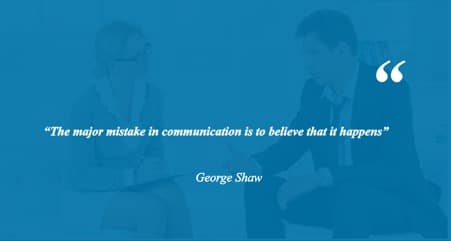
Whether you think of yourself as a world-class professional communicator or just someone who prefers dealing with emails, chances are, you have a few bad communication habits that drive people crazy. But don’t beat yourself about it!
Here are some good examples of poor communication skills you should avoid and quick ideas on how to improve them.
1. Constant interruptions
I don’t know about you, but when someone continually interrupts me, it gets on my nerves. We all have one thing in common, especially when holding a conversation; we all want to be listened to.
Therefore, if you are those people who like to jump into conversations and interrupt the other person, or even try to complete their sentences, then you need to hit the pause button.
You might be fooled into thinking your constant interruptions are a way of showing your level of engagement into the conversation. But in the real sense, they are not. It’s a buzzkill, especially in the work area.
Give the people around you a chance to voice their side of the story or even start a new story. That will help to keep the conversation going.
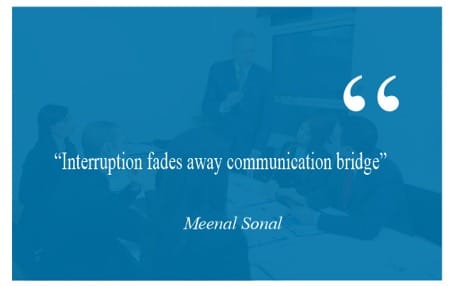
2. Multitasking
Okay, please don’t crucify me yet before listening to my explanation! I don’t mean texting your friend while holding a conversation with someone else is a bad thing.
It might get to most people’s nerves, but you can do it with limits. My problem is with someone who gets wholly absorbed with a news headline or even something else that they completely forget what you are talking about.
Multitasking is a habit that we are all vulnerable to. A slight glimpse at your phone is not a big problem. However, you need to be present to any conversation you are holding, no matter how futile it may seem.
Therefore, don’t scroll your email or check your grocery list while having a conversation with your superior or even just someone at work,
3. Using qualifiers
For instance, saying ‘don’t take this the wrong way,’ or ‘I know what you are thinking of but.’ Such qualifiers can exist in every situation, and we are all guilty of using them, including me.
However, if you tend to overdo them, then that could quickly build a wall between you and the people around you.
As much as these statements may help to sugar-coat the sentence that follows, they often just come out as being unnecessary and condescending. And with that in mind, you should always avoid using them.
4. Altogether avoiding any direct contact
Thanks to the internet and most advances in technology, you can communicate with most people without necessarily meeting up with them.
But if you’ve ever dealt with someone who wrote a lengthy text and they had the option of meeting up with you face to face, then it can sometimes be frustrating.
The vast option of communication tools has made us less willing to hold a one on one conversation. Therefore, before sending a text to someone, ask yourself if it’s better to meet with them or not. That will save the person receiving the long message and also you a lot of headaches.
5. One-sided communication
As a poor communicator, you will quickly get frustrated when you don’t get any feedback.
For instance, if you send an email, project plan, or a simple message and there’s no response from the recipient. However, the problem might be talking too much.
Being a good communicator means that you should be able to sit back and listen in a way that could invite a conversation.
Allow the other party a chance to respond to your message and do not drive to a conclusion without getting their opinion. Don’t present the final idea but allow room for alternatives.
6. Floundering
I know we’ve all dealt with people who seem to be rambling without necessarily getting to any point; people who love the sound of their voice.
You don’t want to garner this sort of a reputation for yourself. There’s no need to rush into a conversation. Take a minute and align all your thoughts in order and make sure that you conclude.
The main reason why you might find yourself talking without arriving at any point is a lack of thought organization. Make sure when you speak, you are clear and concise. It’s as simple as that.
7. Waiting
There’s a big difference between listening and hearing. And whenever you are having a conversation with someone, you should be actively listening to their speech.
That means that apart from being silent, you should listen to what the other person is saying while waiting for your chance to speak.
That shows that you are engaged in what the other party is saying. And trust me, everyone can tell when you are not listening to them.
8. Equating their situation to yours
Well, this happens more often than not. Tell me if this sounds familiar; you are explaining to someone your difficult situation that you are going through, and the other person suddenly says, ‘I know how that feels.’
The person who was supposed to listening to you starts explaining an event that’s not similar to yours.
You need to remember that we have different experiences every day. It’s okay to try and be empathetic with the other party’s situation. But instead of listening, you are telling your story.
In the video below, you will see a great example of what poor communication skills look like and why it’s so important that we all learn how to improve them.
Where to Use Communication Skills?
Whether you are on a job search or already in a job, good communication skill is one of the essential requirement to stay afloat.
Most importantly, when searching for a job, everything about you, right from your resume down to the job interview and after employment, will require various types and styles of communication skills.
Below are some ways to utilize your communications skill at each step;
1. Communication skills for a cover letter
One of the best places to showcase your communication skills is in your cover letter since your cover letter gives your employer the first impression of your skills.
So, when writing your cover letter, you should endeavor to make it brief, concise, without typographical error, and well-tailored to the position you are applying to occupy.
2. Communication skills for a resume
Another important place to use your communication skills is in your resume. A well-written resume is an excellent way to display how strong your communication skills are.
In portraying good communication skills in your resume, you must ensure that it is well-structured with no grammatical or spellings errors.
Also of paramount importance is including some positive communication skills you have acquired, especially when the job description is keen on good communication skills.
3. Communication skills for a job interview
Besides your physical presentation and appearance, a good communication skill through the nonverbal cues you are exhibiting through your body language is essential during job interviews.
To show that you are well-groomed with good communication skills, you should maintain eye contact with your interviewers, employ an active listening skill, and respond to questions with confidence.
CONCLUSION
In order to truly improve on our poor communications kills, and learn about the most critical communication skills we should be learning we need to be willing to drop some bad habits and start practicing good ones. On this communication skills guide you find all the basics of communication, but also some interesting tips around what specific skills you should master for different occasions.
I hope you enjoyed and learned a lot, and would love to read your comments on the article.
Reference
- https://www.psychologytoday.com/us/blog/the-superhuman-mind/201611/5-signs-youre-dealing-passive-aggressive-person
- https://www.psychologytoday.com/us/blog/communication-success/201601/15-control-tactics-difficult-people
- https://www.entrepreneur.com/article/222455
- https://www.inc.com/jeff-haden/bosses-when-you-should-be-the-one-to-speak.html
- https://blog.smarp.com/top-5-communication-skills-and-how-to-improve-them
- https://medium.com/@makingbusinessmatter/the-ultimate-guide-to-communication-skills-da823221ec60
- https://blog.hubspot.com/marketing/communication
- https://www.beekeeper.io/blog/communication-skills/
- https://www.indeed.com/career-advice/resumes-cover-letters/communication-skills
- https://www.acethepresentation.com/polish-your-communication-skills/








